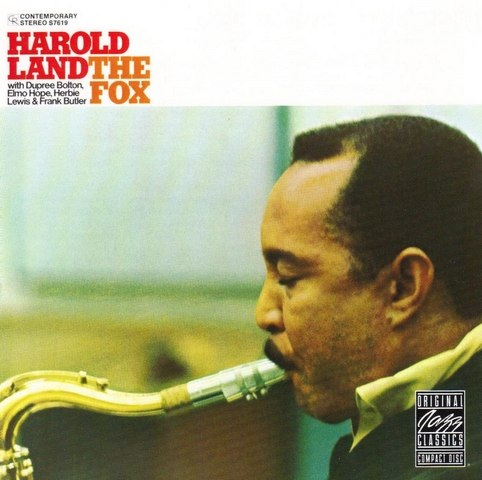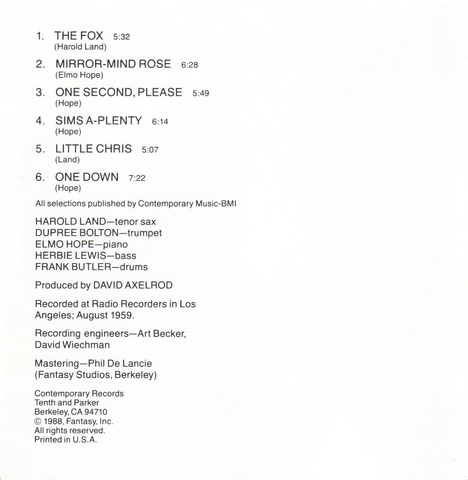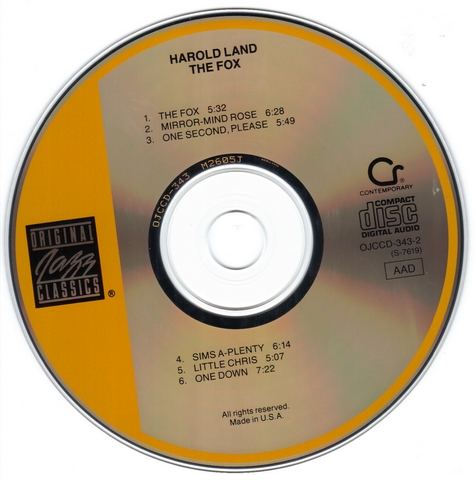


BOOKLET
Looking back, it seems the quality and fervor of the music created a decade ago in Los Angeles was more significant than many of us then realized. Despite opportunites to hear some of these vigorous happenings via records, important musicians of the time were ignored partly because of a geographical handicap, and partly because lack of popular acceptance had driven much of their music underground. That the excitement of the period is not merely a hallucination induced by retrospect or nostagia is proved beyond doubt with this reissue of The Fox.
In 1959, when it was recorded, Harold Land was one of the underrated, underground musicians gigging around Los Angeles. “We were making progress in Los Angeles, even if nobody was aware of it. There wasn’t much money, but we were having a lot of beautiful musical moments.”
The “we” of that statement refers mainly to the so-called underground men around town: the Curtis Counce group with Carl Perkins and Harrold; Paul Bley, Ornette Coleman, Don Cherry, Scott LaFaro, and many others, almost unknown at the time, including the members of the present group.
Dupree Bolton is one of the extraordinary might-have-beens of jazz history. Land discovered him sitting in at a Southside Los Angeles club, playing with a vitality and freshness the like of which had not been heard since the days of Clifford Brown and Fats Navarro, and determined immediately to use Bolton on a record date. The Fox was the trumpeter’s first session; in fact, one of the very few records he made. Nobody seems to know where he came from or where he is today.
Elmo Hope, born in New York City in 1923, was a contemporary and close friend of Bud Powell. He, Bud and Thelonious Monk all seem to have influenced each other in the early 1940s. He toured from 1948-51 with trumpeter Joe Morris’s band, then gained some prominence around New York on records and jobs with Clifford Brown, Sonny Rollins and others.
The Fox and his own album, The Elmo Hope Trio on Contemporary, were made during a two-year stay in Los Angeles, 1959-61, when Hope worked in night clubs with Land. Never fully recognized as one of the first and most original pianists to emerge from the bop era, he died in New York in 1967.
Frank Butler, from Wichita, Kansas, is the same age as Harold Land and has been working around California for almost 20 years. He picked up some imposing credentials along the way, with Dave Brubeck in 1950, Edgar Hayes from ’51-53, Duke Ellington in ’54, Perez Prado and Curtis Counce in ’56, and later with Harold Land, Phineas Newborn, and John Coltrane.
Herbie Lewis, born in 1941 in Pasadena, California, took trombone and voice lessons before switching to bass at the age of 16. Almost entirely self-taught, he made his professional debut in Los Angeles with Dave Pike’s combo, later working with Teddy Edwards, Bill Perkins and Les McCann. He was only 18 when he made his recording debut with The Fox. Today, he works and records with McCoy Tyner.
Harold explains few people know why the composition which gives the album its title is called “The Fox.” “The truth is, that was a nickname Lawrence Marable, the drummer, dropped on me and which hardly anyone ever uses now. Aside from that, I felt that this particular composition has the speed, the action and movement of a fox. So it seemed like a fitting title.”
Land also wrote “Little Chris” for his then nine-year old son. Today young Land is one of the most promising young pianists and often works with his father in the Gerald Wilson orchestra.
The other four pieces are all by Hope, of whom Land says: “Elmo was equally talented as a soloist and composer, but with a difference. In his solos he’s loose and free, while in his writing there’s a sense of form. Elmo truly had a touch of genius. I was in awe of him.”
Summing up what The Fox means to him, Harold recalls: “The highlights of the session were the compatibility of the musicians, and Elmo’s compositions. Even when I was in Europe in the summer of 1969 people were asking me about this album. The session has always loomed large in my mind as an important event.
–LEONARD FEATHER, from the liner notes.
